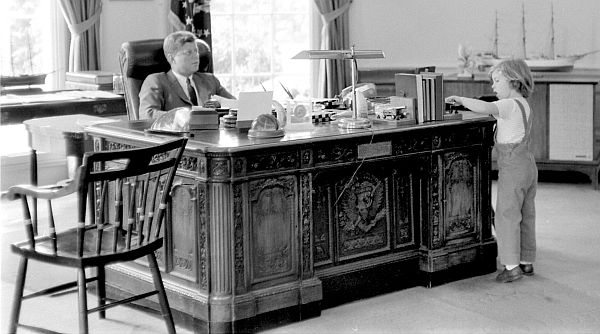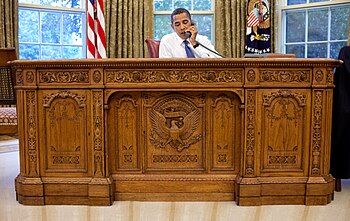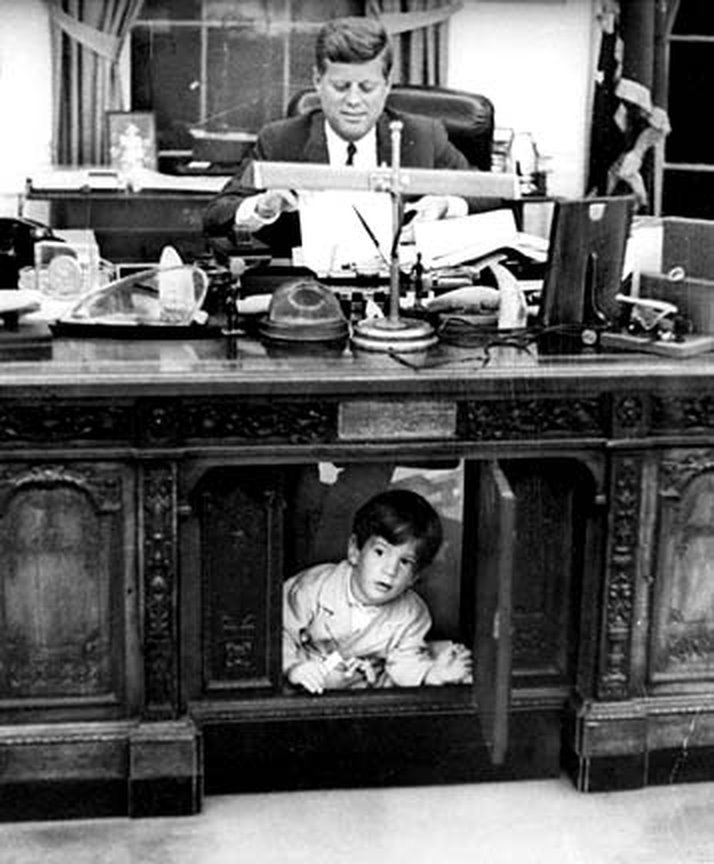NOW THAT THE AMERICAN PRESIDENTIAL RACE IS ON, ATTENTION IS ONCE AGAIN FOCUSED ON THE WHITE HOUSE AND ITS CHIEF TENANT.
So here is a glimpse inside the White House and the famous Resolute Desks that feature so prominently in the hit movie 'National Treasure 2'!
|
President's Oval Office & Resolute Desks 
The Oval Office with new draperies
at Christmas, 2010 (White House -
Pete Souza)
More Images
The Oval Office in new livery, 2010 (BBC - Reuters)

View from the desk, 2010 (Huffington
Post - AP)

The new rug, 2010 (BBC - Reuters)

Barack Obama enters the Oval Office
for his first full day as president, 2009 (White
House - Pete Souza)

Barack Obama speaking with Hillary Clinton
in 2009; note the change of paintings (White
House - Pete Souza)

President Bush meets with
President-elect Obama in 2008 (White
House)

The new Oval Office flooring, 2005
   
Oval Office History
Hand-tinted photo of William Howard
Taft's original Oval Office
in the center of the West Wing, circa 1909 (White House Historical Association)

The office around 2006, looking south
(White House Historical Association)

President Bush takes a photo of
close friends in 2008 (Ruawildeone
- White House)
Computer recreation of George W
Bush's Oval Office (Google Sketchup
- Peter Sharkey)
Computer recreation of George W
Bush's Oval Office (Google Sketchup
- Peter Sharkey)

The office around 2006, looking
northwest (White House Historical Association)

George W Bush meeting with rock
star and AIDS activist Bono in 2005 (White
House - Eric Draper)

George W Bush commemorating the
Americans with Disabilities Act in Oval Office in 2005 (White House - Eric Draper)

George W Bush hosting a meeting in
the Oval Office decorated with the new presidential rug on December 20, 2001 (White
House - Paul Morse)

George W Bush in the Oval Office,
circa 2001, using the Reagan rug (White House)

George W Bush in front of the open
door to the study and (at far end) dining room in 2001 (White
House)

The Clinton Oval Office, circa 1996 (Clinton Library)

The Clinton Oval Office, circa 1996
(White House Historical Association)

Replica of the Clinton Oval Office
at the Clinton Library (Larry
Miller)

George HW Bush and members of his
staff at work Oval Office, circa 1992 (White
House Historical Association)

George HW Bush and members of his
staff at work Oval Office, circa 1992 (Bush
Library)

George HW Bush and members of his staff
at work Oval Office, circa 1990 (NARA
- Bush Library)

George HW Bush and members of his
staff at work Oval Office, circa 1990 (NARA
- Bush Library)

Ronald Reagan wraps up some
business on his last day office in 1989 (Reagan
Library)

Replica of the Reagan Oval Office
in the Reagan Library

The Reagan Oval Office in 1981
(using the Ford-Carter decor) (Reagan
Library)

Jimmy Carter meeting with Israeli
Prime Minister Golda Meir in 1977 (NARA
- Carter Library)

The Carter Oval Office in 1977
(Carter used Ford's final decor) (NARA
- Carter Library)

Reproduction of the Ford Oval
Office in the Ford Library

Gerald Ford in the Oval Office,
circa 1974 (still using Nixon's decor) (Ford
Library)

Richard Nixon with comedian and
golf-enthusiast Bob Hope in 1973 (NARA)

Richard Nixon talking with the
Apollo 11 astronauts in 1969 (NARA)

The Oval Office in 1969, with
Johnson's decor and Nixon's desk (White House
Historical Association)

LBJ and his staff monitor
television coverage of the assassination of Martin Luther King, Jr. (Johnson Library)

Replica of the Johnson Oval Office,
circa 1966, in the Johnson Library (Daniel Stout)

The Johnson Oval Office in 1964,
still using the red Kennedy rug (Johnson Library)

The Johnson Oval Office in 1964,
temporarily using the final Kennedy rug and curtains but with
LBJ's desk—built for him by the Senate cabinet shop (White House Historical Society) 
The new Kennedy Oval Office in
1963, completed while the first couple was visiting Dallas
and dismantled after the assassination, before Mrs. Kennedy returned (Kennedy Library) 
The new Kennedy Oval Office in
1963; note JFK's footrest to ease his back pain (Kennedy
Library)

The Oval Office in 1962, with
Truman's decor and the Resolute desk (White
House Historical Association)
 
John Kennedy in a rocking chair,
around 1962 (Life)

John Kennedy in the Oval Office,
1961 (still using the Truman/Eisenhower decor) (NARA
- Kennedy Library)

John Kennedy around 1961 (Life)

The Eisenhower Oval Office in 1960 (National Geographic)

The Eisenhower Oval Office, circa
1956 (Eisenhower
Library)

The Eisenhower Oval Office, circa
1956 (Eisenhower
Library)

The Eisenhower Oval Office, circa
1956 (Eisenhower
Library)

The north view in 1950 (NARA)

The east doors to the Rose Garden,
circa 1950 (Truman
Library - Abbie Rowe)

The modern Oval Office in 1947,
famous for Truman's "The
Buck Stops Here" sign (Truman Library)

A recreation of Truman's Oval
Office at the Truman Library (Truman Library)

Truman Oval Office in 1946, with
Roosevelt decor (NARA)

Truman Oval Office in 1945, with
portraits of FDR, Simón Bolívar,
and George Washington (Truman
Library)

Close-up of the Roosevelt valance,
same as presidents before him, back to Taft (NARA)

Franklin Roosevelt's first modern
Oval Office, circa 1936 (Library of Congress -
Theodor Horydczak)

Franklin Roosevelt with secretary
Missy Le Hand, circa 1935 (White
House [Roosevelt Library])

Replica of FDR's Oval Office in the
Roosevelt Library (Roosevelt Library)

FDR's Oval Office in 1945 (Life)

Herbert Hoover in 1932 (NARA)

Herbert Hoover in the rebuilt Oval
Office in 1930 (Corbis)

Aftermath of the Christmas Eve fire
in the old West Wing, 1929 (Library of Congress)

The Coolidge Oval Office in 1927 (Library
of Congress - Harris & Ewing)

The Oval Office around 1925

Calvin Coolidge in 1923 (Library of Congress)

The original Oval Office in 1923
(the black crepe memorializes President Harding) (Library of Congress)

The original Oval Office circa 1923
(probably taken at the same time as the one above) (Library of Congress)

The original Oval Office circa 1921

Woodrow Wilson signs the Army &
Navy bill in 1918

Woodrow Wilson at his desk, circa
1917

Hand-tinted photo of the William
Howard Taft's original Oval Office
in the center of the West Wing, circa 1909 (White House Historical Association) 
The original Oval Office, circa
1909

Hand-tinted photo of Theodore
Roosevelt's original West Wing office in 1904 (now the Roosevelt
Room),
directly adjoining his Cabinet Room (Library of Congress) 
Theodore Roosevelt (at center) with
his Cabinet in 1903 (Library of Congress)

The new Oval Office flooring, 2005 (Rode
Bros. Flooring)
|









No comments:
Post a Comment